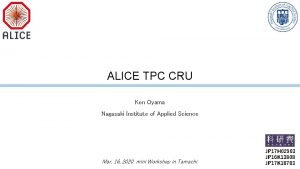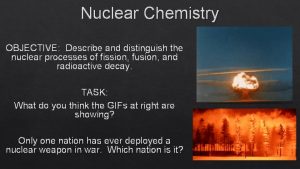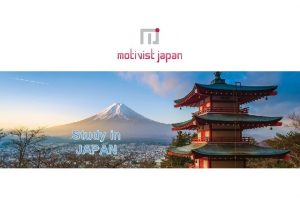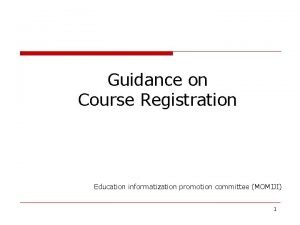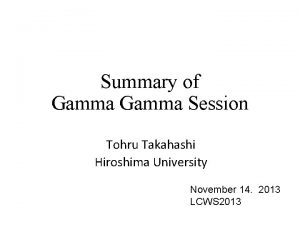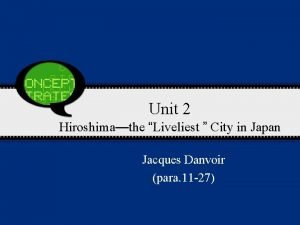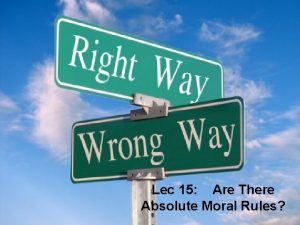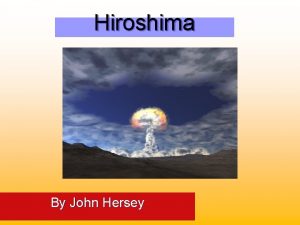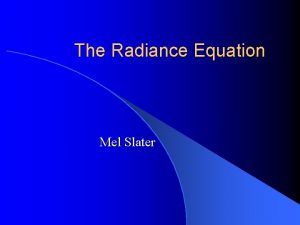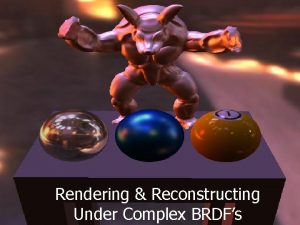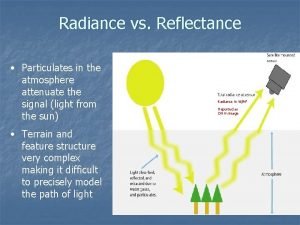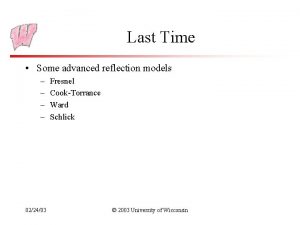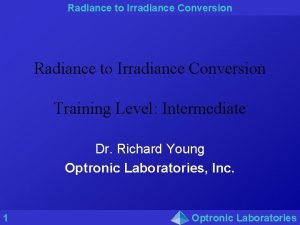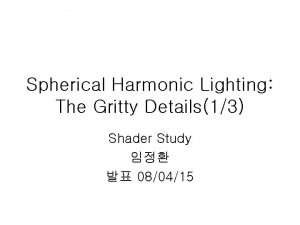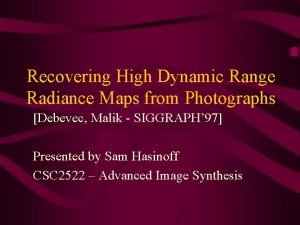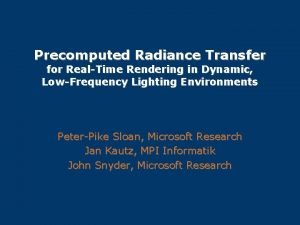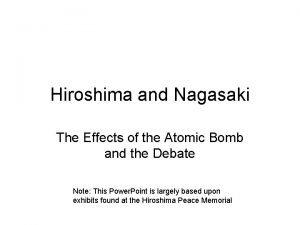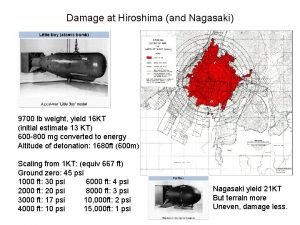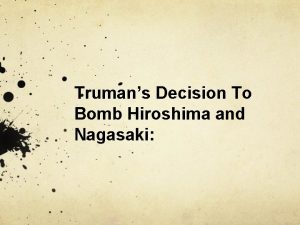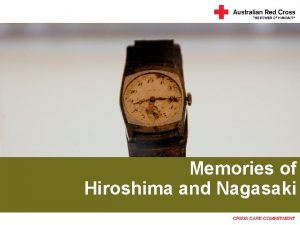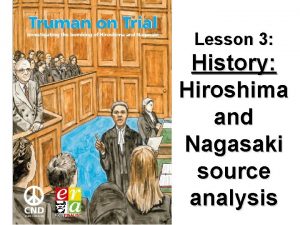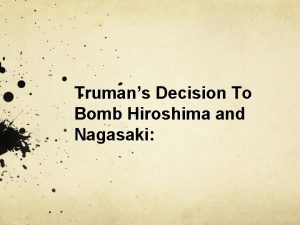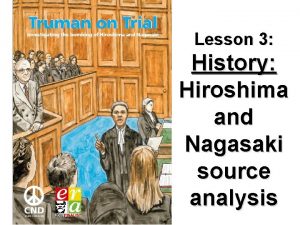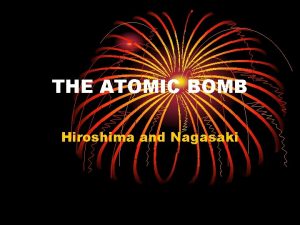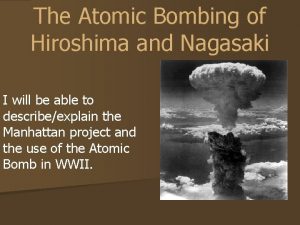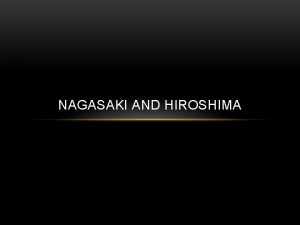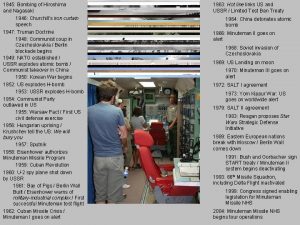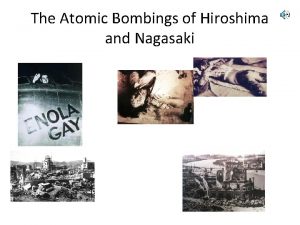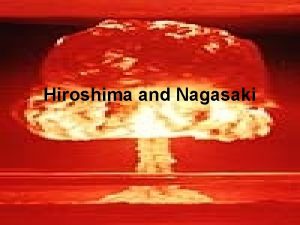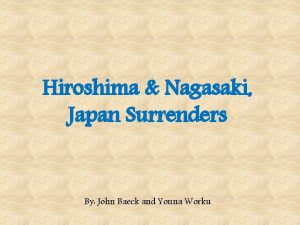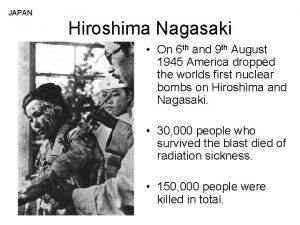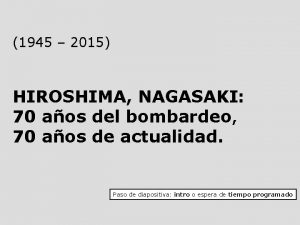Hiroshima and Nagasaki If the radiance of a






















- Slides: 22

Hiroshima and Nagasaki “If the radiance of a thousand suns were to burst at once into the sky, that would be like the splendor of the mighty one. . . ” -J. Robert Oppenheimer, quoting Hindu Scripture

Japan in the End l By 1945, the Japanese Empire was unraveling l l l The Allies had taken back most of what Japan had conquered Japanese wartime production couldn’t keep up with the United States Japan continued to fight effectively in the Pacific The war in Europe had basically ended with the surrender of Germany on May 8, 1945 l The war in the Pacific continued l

Death of Roosevelt Franklin Roosevelt died on a cerebral hemorrhage in Warm Springs, Georgia on April 12, 1945, less than three months into his fourth term l He was succeeded by his new Vice-President Harry Truman, who had little experience, and didn’t even want to be Vice. President l

Truman and Japan l After becoming President, Truman sought to end the war quickly. l l l The war in Europe would end in a matter of weeks Japan proved to be more elusive Potsdam Declaration l l l Statement calling for the unconditional surrender of Japan Threatened “prompt and utter destruction” if not accepted Japanese refused (mokusatsu)

Manhattan Project l Project during World War II to develop a nuclear bomb l Scientific research led by American physicist J. Robert Oppenheimer l Project work sped up during World War II Dr. J. Robert Oppenheimer

Decision to “Drop the Bomb” l Location l l Several sites were explored Wanted a large metropolitan area where the blast would create “effective damage” Decided on the cities of Hiroshima and Nagasaki (Kyoto was rejected because of its beauty and historical significance) After Japanese rejection of the Potsdam Declaration, President Truman signed the order to proceed with the Bombings

The bombing sites

The Bombs “Little Boy”, dropped on Hiroshima “Fat Man”, dropped on Nagasaki

The Plane and Pilot B-29 Bomber, the Enola Gay Brigadier General Paul Tibbets Pilot of the Enola Gay

Hiroshima l Bomb was dropped at 8: 15 a. m. local time Fell for 57 seconds l Detonated 2000 feet above the city l l Missed its intended target due to crosswinds Mushroom cloud over Hiroshima about 1 hour after the bombing

Destruction l l l Temperature at the hypocenter are estimated to have reached several million degrees centigrade All wooden structure within a 1. 2 mile radius were destroyed All concrete structure with 1500 feet were destroyed Five square miles of the city was reduced to ashes 63% of the 76, 000 buildings were destroyed This all happened almost instantaneously

Hiroshima – Before and After

The people l 50% death rate within 1. 2 miles of the hypocenter 70, 000 -80, 000 were killed instantly (including 90% of the doctors and nurses) l 70, 000 plus had severe injuries l l 119, 000 people died within 1 year l Number stands at around 140, 000 today l Thousands suffer from radiation sickness, various cancers, and birth defects

Pictures Japanese woman with the pattern of her dress burned into her flesh A burned body near the hypocenter

Pictures Melted bottles and a melted downtown Hiroshima

Nagasaki l Bomb exploded after a 43 second drop l Generated temperatures of about 3900 degrees centigrade and winds up to 624 miles per hour l 40, 000 -75, 000 dead l 2. 6 square miles of the city reduced to ashes

Nagasaki – Before and after The total destruction of Nagasaki

Historic district of Nagasaki Clock of victim stopped at exact moment of detonation

Atomic Shadows

Japan surrenders Having no other alternative, Japan formally surrendered to the Allies on August 15, 1945 l Surrendered aboard the U. S. S Missouri l General Douglas Mac. Arthur and Admiral Chester Nimitz accepted the surrender l

Hiroshima and Nagasaki today Hiroshima Peace Memorial Hypocenter Memorial in Nagasaki

Hibakusha l Translates to “Explosion affected people” l People who survived the blasts l Receive government aid from Japan l Discriminated against Tsutomu Yamaguchi (1916 -2010) A survivor of both Atomic Bombs
 Nagasaki location
Nagasaki location Cruken
Cruken Shadows from hiroshima
Shadows from hiroshima Motivist japan
Motivist japan Hirodai momiji
Hirodai momiji Tohru hiroshima
Tohru hiroshima Jacques danvoir
Jacques danvoir Micron japan hiroshima
Micron japan hiroshima Hiroshima
Hiroshima Hiroshima
Hiroshima Hiroshima
Hiroshima Radiance equation
Radiance equation Total radiance
Total radiance Radiance vs reflectance
Radiance vs reflectance Total radiance
Total radiance Irradiance to radiance conversion
Irradiance to radiance conversion Precomputed radiance transfer
Precomputed radiance transfer Radiance map
Radiance map Precomputed radiance transfer
Precomputed radiance transfer Hình ảnh bộ gõ cơ thể búng tay
Hình ảnh bộ gõ cơ thể búng tay Slidetodoc
Slidetodoc Bổ thể
Bổ thể Tỉ lệ cơ thể trẻ em
Tỉ lệ cơ thể trẻ em

